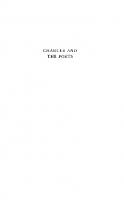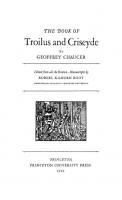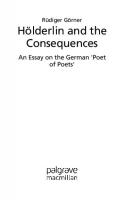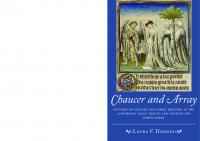Chaucer and the Poets: An Essay on Troilus and Criseyde 9781501707100
In this sensitive reading of Chaucer’s Troilus and Criseyde, Winthrop Wetherbee redefines the nature of Chaucer’s poetic
157 86 18MB
English Pages 256 [251] Year 2016
Recommend Papers

- Author / Uploaded
- Winthrop Wetherbee
- National Endowment for the Humanities Open Book Program
File loading please wait...
Citation preview
CHAUCER AND THE POETS
CHAUCER AND THE POETS AN ESSAY ON
Troilus and Criseyde WINTHROP WETHERBEE
Cornell University Press ITHACA ANO LONOON
Copyright © 1984 by Cornell University All rights reserved. Except for brief quotations in a review, this book, or parts thereof, must not be reproduced in any form without permission in writing from the publisher. For information, address Cornell University Press, Sage House, 512 East State Street, Ithaca, New York 14850, or visit our website at www.cornellpress.cornell.edu. First published 1984 by Cornell University Press. First printing, Cornell Paperbacks, 2016. Library of Congress Cataloging-in-Publication Data Wetherbee, Winthrop, 1938– Chaucer and the poets. Includes index. 1. Chaucer, Geoffrey, d. 1400. Troilus and Criseyde. 2. Chaucer, Geoffrey, d. 1400. Troilus and Criseyde—Sources. 3. Chaucer, Geoffrey, d. 1400.—Knowledge—Literature. 4. Love in literature. I. Title. PR1896.W48 1984 821'.1 84-7080 ISBN 978-0-8014-1684-2 (cloth : alk. paper) ISBN 978-0-5017-0723-0 (pbk. : alk. paper) The text of this book is licensed under a Creative Commons Attribution-NonCommercial-NoDerivatives 4.0 International License: https://creativecommons.org/licenses/by-nc-nd/4.0/
3050-2265d-1Pass-r02.indd 2
5/14/2016 9:02:59 PM
To My Best Friend, Andrea
Contents
1.
2.
3· 4· 5· 6. 7· 8.
Preface A Note on Texts Introduction The Narrátor, Troilus, and the Poetic Agenda Love Psychology: The Troilus and the Roman de la Rose History versus the Individual: Vergil and Ovid in the Troilus Thebes and Troy: Statius and Dante's Statius Dante and the Troilus Character and Action: Criseyde and the Narrator Troilus Alone The Ending of the Troilus Index
9 13 17 30 53 87 111 145 179 20 5 224 245
Preface
T
his book argues that Chaucer's Troilus is a major statement about poetic tradition. Chaucer, who was remarkable in his early and profound appreciation of the achievement of Dante, shared Dante's sense of the special excellence of the classical Latin poets, Vergil, Ovid, and Statius. Like Dante, he recognized that classical poetry presented an authoritative view of human experience which earlier medieval poets had assimilated only partially and with an imperfect awareness of the dynamic role the Latin poets could play in the development of a classical tradition of Christian poetry. The Troilus is, of course, one of the great medieval statements on love, deeply indebted to Boethius and the Roman de la Rose, and it owes an obvious debt as well to the tradition of the romans d'antiquité, but it adopts a new perspective on these medieval affinities. Chaucer places his medieval version of a pagan love story in a context of allusions to classical epic which deepen and complica te its meaning, making the story a significant foil to the religious perspective that surfaces in the final stanzas of the poem. Too little work has been done on Chaucer's poetics. There is still a persistent tendency to assume that he viewed "poetry" as synonymous with "courtly poetry," an assumption that 1 hope my discussion of the literary context of the Troilus may help to correcto The relations of different literary modes, in particular the opposition between courtly "making" and classically ori-
[9]
[10]
Preface
ented "poetry," seem to me a central concern in Chaucer's work. 1 have tried to provide a concrete illustration of how this opposition functions in the Tmilus, tracing the poet-narrator's evolution from a writer of romance who views his material in the idealizing light of the courtly lo ve tradition to a disciple of the poetae, capable of realizing the tragic and finally the spiritual implications of his story. In assessing Chaucer's debt to the classical poets and Dante I ha ve tried to show that his engagement with them was a literary one-the engagement of an individual talent with its traditionthat he read them as poets, and that their influence was as complex as that of any major poet on another. These would not be controversial assumptions if we were talking about Milton, but the case of a medieval poet presents special problems. Having been shown to our profit the importance of commentary, gloss, and mythographical compendium in accounting for medieval notions about classical poetry, we tend to substitute such tools for the texts of the poets themselves, forgetting that these texts were read as well as annotated. Fulgentius and John of Garland have proved more efficient than direct recourse to the Aeneid or the Metamorphoses as a way of "cracking" medieval allusions to Vergil and Ovid; and while the cold finger of moral pedantry sometimes touches the spirits of practitioners of this method, it clearly reflects certain medieval habits of reading. There is a risk, however, of confusing the categories and purposes of teachers and glossators with those of poets. Without questioning Chaucer's knowledge of the commentators, I have tried to show that there is a significant difference between his use of them and his direct recourse to the poets themselves and that his reading of Ovid and Statius acknowledges interplays of theme and context which the commentaries, with their very different purposes, often ignore. It is finally the texts themselves, "the forme of olde clerkis speche," that meant most to Chaucer, as to Dante. In exploring the relation of these texts to the Troilus I have tried to locate and explicate what Chaucer, at those moments when he felt himself to have made contact with it, called poetry. A great many friends and friendly institutions have helped me see this project through. Most of the reading and much of the
Preface
[ 11]
writing were done with the benefit of fellowships from the John Simon Guggenheim Memorial Foundation and Cornell University's wonderfully hospitable Society for the Humanities. Friends who gave generously of their time to read and criticize ponions of my manuscript include Stephen Barney, James Chandler, Carolyn Dinshaw, Judy Ferster, Nicholas Havely, Mark Lambert, Shirley Lukitsch, Michael Murrin, Lee Patterson, Allen Shoaf, and Michael Twomey. Jay Schleusener, in addition to reading most of the manuscript, spent several long afternoons of conversation helping me work out my ideas at an early stage, and Caron Cioffi, Rory Holscher, Rozalyn Levin, and Linda Lomperis have offered many helpful criticisms and suggestions along the way. Sherron Knopp produced a remarkably thorough and probing repon for Cornell University Press and pointed the way to a number of important revisions. Finally, Allison Dodge, who edited for the Press what I had foolishly imagined was my final draft, made yet more valuable suggestions about organization and persuaded me to purge a great deal of gratuitous academese. I ha ve not followed all my friends' suggestions, even when they were right, but they are largely responsible for whatever coherence this essay may possess. Portions of two articles are incorporated at various points in the book: "The Descent from Bliss: Troilus 111, 1310-1582," first published in Chaucer's 'Troilus': Essays in Criticism, ed. Stephen A. Barney (Hamden, Conn., 1980), pp. 297-317, and "'Per te poeta fui, per te cristiano': Dante, Statius, and the Narrator of Chaucer's Troilus," which appeared in Vernacular Poetics in the Middle Ages, ed. Lois Ebin (Kalamazoo, Mich., 1984), pp. 153-76. I am grateful to Medieval Institute Publications of Western Michigan U niversity for permission to reprint material from the latter article. WINTHROP WETHERBEE
Chicago, Illinois
A Note on Texts
A
II quotations from the Troilus are from the edition of R. K. Root, The Book of Troilus and Criseyde (Princeton University Press, Princeton, N.]., 1926). For Vergil 1 ha ve used the Oxford Classical Texts edition of R. A. B. Mynors (Oxford University Press, Oxford, 1969); for Ovid, the Budé edition of the Metamorphoses, ed. Georges Lafaye, 3 vols. (Les Belles Lettres, Paris, 1928-30); for Statius, the Teubner edition of the Thebaid, ed. Alfred Klotz, rey. Thomas C. Klinnert (Teubner Leipzig, 1973); for the Roman de la Rose, the Classiques fran

![Troilus and Criseyde, The Canterbury Tales by Geoffrey Chaucer [1 ed.]](https://ebin.pub/img/200x200/troilus-and-criseyde-the-canterbury-tales-by-geoffrey-chaucer-1nbsped.jpg)
![Oxford Guides to Chaucer: Troilus and Criseyde [2 ed.]
0198878818, 9780198878810](https://ebin.pub/img/200x200/oxford-guides-to-chaucer-troilus-and-criseyde-2nbsped-0198878818-9780198878810.jpg)

![Oxford Guides to Chaucer: Troilus and Criseyde [2 ed.]
0198878818, 9780198878810](https://ebin.pub/img/200x200/oxford-guides-to-chaucer-troilus-and-criseyde-2nbsped-0198878818-9780198878810-d-1422288.jpg)




